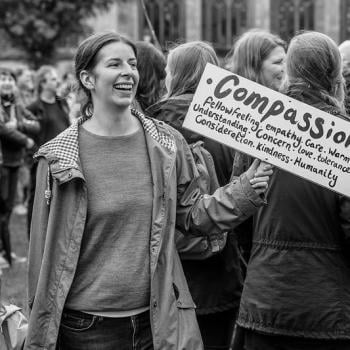#5 Long-term Partnering
Sexual intimacy has a special and unique role when it occurs in the context of a permanent life-long committed relationship. God wants us to support and nurture stability in long-term relationships as an important part of God's vision for humanity.
On some level that we may not easily understand and in spite of all the unhappiness and confusion in many of the marriages we know, marriage continues as a powerful institution in the lives of our nations and our own religious society. Marrying each other without the assistance of priests was a radical step by early Friends. Marriage was an act that our local religious community took direct responsibility for. The act of approving and conducting wedding ceremonies is the most direct and formal intervention of our local meeting community into the personal lives of Friends. The act of marrying is considered a spiritual action of great significance.
I took a course many years ago with Parker Palmer during his final term at Pendle Hill on the subject of community. We looked a lot at monastic communities and what made them tick. He reframed the three traditional vows of chastity, poverty, and obedience as purity, co-ownership of goods, and stability. The vow of stability was the idea that "even when times get rough, I will not run off to the next monastery down the road."
Jesus said nothing whatsoever about homosexuality. He very clearly and explicitly, however, rejected divorce. (See Matthew 5:31.) There is almost no major religious community in this country today that holds firmly to the principle that marriage needs to be a life-long commitment. We marry members as a community, even meeting with them to discuss whether the couple has made the right choice. Few meetings get actively involved in members' struggles when their marriage may be falling apart.
I would not suggest that God thinks that divorce is always wrong. Working powerfully to support stability in marriage relationships, however, is an important part of what the religious community does. It also needs to be a central principle guiding the personal acts of those who are trying to act in faithfulness.
We do not have to believe that sex must be limited to marital partners or to believe that all are called to marital partnering to believe that stable and hopefully life-long partnering is a very important part of God's plan for humans. And to believe that the nurturing and support of such relationships is an important part of building the kingdom of God on earth.
Certain activities such as extramarital affairs clearly undermine the stability of marital partnering, family units, and the larger circles that marriages exist in, including the local spiritual community. It is less clear what impact sexual activity between single people has on the viability and stability of marital unions, so we will explore this question separately later.
#6 Honesty and Openness
God desires that we be radically honest with others in our sexual practices and to be willing to allow others to know what we are practicing.
When I teach a course on the Quaker testimonies, I always teach the Testimony on Integrity first. I do this partly because I figure it may have been chronologically the first testimony that Friends discovered that they agreed upon and practiced together. It also seems to be one that the other testimonies in a sense are built upon.
In my view this testimony says that we practice what we preach, that we should not "talk the talk" unless we are prepared to "walk the walk." In the meeting where I grew up we were told that Friends try to practice their faith all week long, not just on Sunday morning. Truth-speaking is quite an endangered species in our culture today. Cheating on taxes is only slightly less popular in this country than it is in Russia. The board game "Scruples" is fascinating because there is so little agreement in our culture today about what is the right thing to do ethically in many situations.
Truth-speaking in relationships obviously precludes affairs behind the back of a spouse and deliberate deceptions such as saying you love someone or are committed to them when you really just want to have casual sex. Beyond that it entails a deeper pattern of openness of one's life with another person -- another child of God.
Although privacy and discretion are clearly important principles when it comes to sexual relationships, there is also an important principle about being willing to have others know the basic way we are living our lives. If we are ashamed or have to hide what we practice, this undermines the fabric of community. Are we engaged in sexual practices (prostitution, going to sex clubs, online pornography) that we would not want others in our family or our meeting to know about? Can we hide what we are doing from ourselves? From God?




